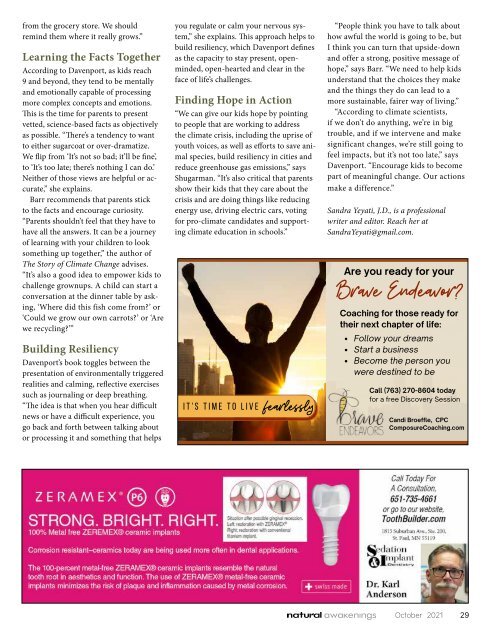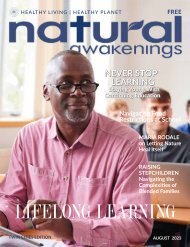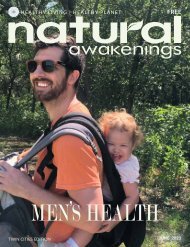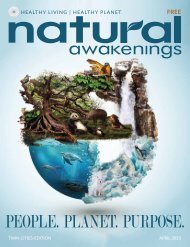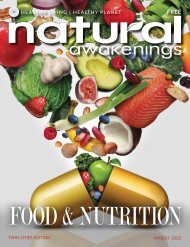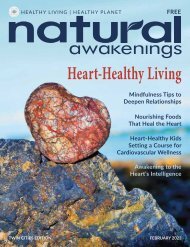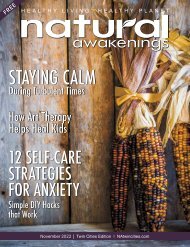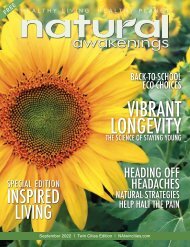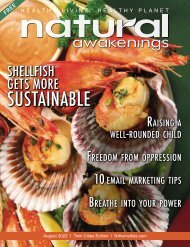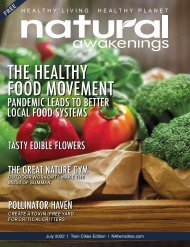Natural Awakenings Twin Cities October 2021
Read the October 2021 edition of Natural Awakenings Twin Cities magazine. This is our annual Healthy Planet Issue which is focused on Living a Simpler Lifestyle and Breast Health. Topics also include the fall fruit recipes, water scarcity, tips on grieving, talking with your children about climate change, cannabis for your pets and so much more! Be sure to check out our local content including News Briefs announcements, Community Resource Guide with providers throughout the metro who can meet your individual wellness needs, and all the happenings in the Calendar of Events. There is additional online-only content that can be found at NATwinCities.com. While you are there, be sure to sign up for our Newsletter and Digital Magazine and continue your reading with our archived articles from local experts.
Read the October 2021 edition of Natural Awakenings Twin Cities magazine. This is our annual Healthy Planet Issue which is focused on Living a Simpler Lifestyle and Breast Health. Topics also include the fall fruit recipes, water scarcity, tips on grieving, talking with your children about climate change, cannabis for your pets and so much more!
Be sure to check out our local content including News Briefs announcements, Community Resource Guide with providers throughout the metro who can meet your individual wellness needs, and all the happenings in the Calendar of Events. There is additional online-only content that can be found at NATwinCities.com.
While you are there, be sure to sign up for our Newsletter and Digital Magazine and continue your reading with our archived articles from local experts.
Create successful ePaper yourself
Turn your PDF publications into a flip-book with our unique Google optimized e-Paper software.
Broeffle, CPC<br />
Candi<br />
ComposureCoaching.com<br />
from the grocery store. We should<br />
remind them where it really grows.”<br />
Learning the Facts Together<br />
According to Davenport, as kids reach<br />
9 and beyond, they tend to be mentally<br />
and emotionally capable of processing<br />
more complex concepts and emotions.<br />
This is the time for parents to present<br />
vetted, science-based facts as objectively<br />
as possible. “There’s a tendency to want<br />
to either sugarcoat or over-dramatize.<br />
We flip from ‘It’s not so bad; it’ll be fine’,<br />
to ‘It’s too late; there’s nothing I can do.’<br />
Neither of those views are helpful or accurate,”<br />
she explains.<br />
Barr recommends that parents stick<br />
to the facts and encourage curiosity.<br />
“Parents shouldn’t feel that they have to<br />
have all the answers. It can be a journey<br />
of learning with your children to look<br />
something up together,” the author of<br />
The Story of Climate Change advises.<br />
“It’s also a good idea to empower kids to<br />
challenge grownups. A child can start a<br />
conversation at the dinner table by asking,<br />
‘Where did this fish come from?’ or<br />
‘Could we grow our own carrots?’ or ‘Are<br />
we recycling?’”<br />
Building Resiliency<br />
Davenport’s book toggles between the<br />
presentation of environmentally triggered<br />
realities and calming, reflective exercises<br />
such as journaling or deep breathing.<br />
“The idea is that when you hear difficult<br />
news or have a difficult experience, you<br />
go back and forth between talking about<br />
or processing it and something that helps<br />
you regulate or calm your nervous system,”<br />
she explains. This approach helps to<br />
build resiliency, which Davenport defines<br />
as the capacity to stay present, openminded,<br />
open-hearted and clear in the<br />
face of life’s challenges.<br />
Finding Hope in Action<br />
“We can give our kids hope by pointing<br />
to people that are working to address<br />
the climate crisis, including the uprise of<br />
youth voices, as well as efforts to save animal<br />
species, build resiliency in cities and<br />
reduce greenhouse gas emissions,” says<br />
Shugarman. “It’s also critical that parents<br />
show their kids that they care about the<br />
crisis and are doing things like reducing<br />
energy use, driving electric cars, voting<br />
for pro-climate candidates and supporting<br />
climate education in schools.”<br />
“People think you have to talk about<br />
how awful the world is going to be, but<br />
I think you can turn that upside-down<br />
and offer a strong, positive message of<br />
hope,” says Barr. “We need to help kids<br />
understand that the choices they make<br />
and the things they do can lead to a<br />
more sustainable, fairer way of living.”<br />
“According to climate scientists,<br />
if we don’t do anything, we’re in big<br />
trouble, and if we intervene and make<br />
significant changes, we’re still going to<br />
feel impacts, but it’s not too late,” says<br />
Davenport. “Encourage kids to become<br />
part of meaningful change. Our actions<br />
make a difference.”<br />
Sandra Yeyati, J.D., is a professional<br />
writer and editor. Reach her at<br />
SandraYeyati@gmail.com.<br />
Brrraaavveeee Endeeeeaaavvorrr?<br />
Are you ready for your<br />
Coaching for those ready for<br />
their next chapter of life:<br />
Follow your dreams<br />
Start a business<br />
Become the person you<br />
were destined to be<br />
Call (763) 270-8604 today<br />
I t ' s T i m e t o L i v e feeeeaaarrrlleeeesssslly<br />
for a free Discovery Session<br />
<strong>October</strong> <strong>2021</strong><br />
29


